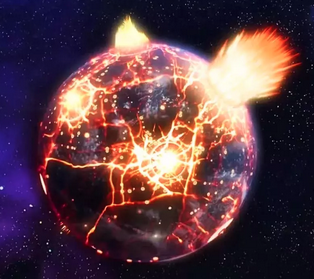- cross-posted to:
- collapse@lemmy.ml
- collapse@lemmy.ml
- collapse@chat.maiion.com
- cross-posted to:
- collapse@lemmy.ml
- collapse@lemmy.ml
- collapse@chat.maiion.com
About the author’s struggle to find someone among his friends to speak to about collapse. He says, "Most of all, I want someone to hug me and say, “I know. I’m scared, too.” Lots of good links in there for further reading.


I think you have a view of time and history that is quite rare. You seem to be using centuries as your unit of measure where very few people can get to even decades as the unit of measure. On your time scale, or larger ones up to and including evolutionary or geological time scales, it’s relatively easy to conclude that “in the fullness of time” will “solve” the problem.
On ordinary time scales, where people look at the next 100 years at most, disaster is looming. That loss of life, major economic depression, and those wars you seem to shrug off as “business as usual” is exactly what is fueling their anxiety. Many of those people would say that your “fullness of time” view is actually a big part of the problem because it looks like complacency and can in fact foster complacency.
On top of that, few people do anything other than linear extrapolation based on recent data. So where you see little blips on a trend line, they see a continuation to infinity of whatever seems to be happening now.
And, of course, there are even people like me, who think that it takes coordinated effort at all scales from individual behaviour to the creation and honouring of global treaties to solve the problem. We already have plenty of those practical people you speak of and we now know that they are all but useless unless we can all agree join them. And we haven’t and aren’t. In that view the tipping point was c. 1980 and we’re now so far over the cliff that the creation of the right kind of society now looks like a pipe dream. Which means that only a “black swan” event or technology can save the day. Hardly the stuff of optimism.
Thanks for the explanation, this does make total sense. If I look at it from a short term lens then yeah I can see where people are having trouble accepting that the next 50 years will look nothing like the prior 50. I also agree not enough people are trying to solve the problems and climate deniers are a huge part of the problem. Is there a way I can use my perspective to contribute to solving the problems without giving in to fatalism?
There probably is, but I haven’t found it yet. I realized pretty early in the game (in human lifespan terms) that our the solution was not to be found in technology but in the structure of society.
In the long view, technology has always advanced, sometimes in “pure” terms, sometimes in response to situations, and sometimes in service to one ideology or another. So there is a sense in which the technology takes care of itself.
What doesn’t seem to take care of itself is society. It’s my view that useful social structures are constructed in opposition to human nature. Individually, we are largely slaves to intuition and a variety of cognitive biases, not least of which is the difficulty of separating a sequence of events from a true causal chain. We tend to embrace ideology, which is about doing what we wish would work, rather than doing what does work.
The great projects of the Renaissance and the Scientific Revolution it engendered started paying clear and obvious social dividends following the Second World War in the wake of critically important foundational work done during the Great Depression. We were starting to make progress on global issues by the 1970s and then something derailed us.
I don’t know what the underlying causes were, but it took only a couple of decades to turn the clock back, possibly as much as a century on some measures. One of the things that gives me hope is that maybe that quick reversal is evidence that we can do it again, but this time in a direction that makes things better.
For myself, I’ve all but dropped trying to address climate change directly (except in my own life) to focus on the larger project of social change. That is my nod to “long history” because I’m old enough that whatever happens to the climate and its impact on me are basically baked in. Thus I’m trying to do what I can to get people around me to start moving toward a more just, equitable, tolerant, evidence-based society.
Any good reading on what social change would look like in order to achieve the ideal society to address climate change?
I first became interested in social and economic theories in high school (early 1970s). The books available to me were mostly pretty old, but I was also very interested in comparing what was said in those writings with what I could happening around me.
I read Karl Marx, John Maynard Keynes, and their detractors. Two things I took away from that reading are that the economy must serve the mass population, not the other way around, and that, at least within a capitalist system, the population does not contain businesses, but business people and those people are just a small fraction of the population. My conclusion was (and remains) that governments must regulate business to prevent them from gaining power and must structure taxes and public services in ways that ensure that society as a whole benefits from productivity gains, not just business people. I recently came across this article that is an excellent starting point for cherry picking the good stuff from both theoretical frameworks.
I then read from the Chicago School of economics and the people in various fields who advocated and argued against it. From that I learned that there are those who would elevate business from being a kind of useful servant of the economy and therefore of society to the objective of the economy and therefore of society. (Something that I’ve recently heard referred to as “neo-feudalism”.)
I read who I’ll call the “social justice warriors”. So civil rights leaders, feminists, prison and justice system reformers, unionists, education reformers, etc. The biggest thing I took away from that reading was that certain kinds of discrimination (say, Affirmative Action) can be temporarily justified as methods of reparation and correction of historical wrongs and the ongoing generational fallout, but that the primary goal should be the creation of a society in which privilege is not an accident of birth, health, or circumstance.
I read quite widely on ecology, but quite heavily on the difference between renewable and nonrenewable resources. It’s less obvious than most people think. There are obvious nonrenewable resources like fossil fuels, minerals, and metals, but a forest is not renewable if not harvested in sustainable ways. Going further, that forest is part of an ecological system and ecological systems are not renewable if overly disrupted, so sustainable harvest is not just about planting replacement trees, but preserving ecologies, and not just for display and recreation, but for regeneration. The places we dump our waste are also resources and their renewability is based on the nature and volume of waste.
Some more recent reading includes things like Shock Doctrine, which examines one aspect of how disasters can be leveraged by those with the resources to survive a disaster to further increase their access to resources at the expense of those without the resources to survive the disaster on their own.
Some of my favourite reading comes from those who argue against the doomers throughout history. For example, it’s trivial to find someone who says Malthus was wrong, but very difficult to find anyone who actually argues against the foundational thesis that populations, including humans, grow to the limits of available resources. That is, breaking new ground, literally or technologically, can never be more than a temporary solution. Likewise with respect to everything from social service programs and the failure of critics to properly account in detail for the actual sources of profits associated with privatization.
For defining and constructing societies that serve people, I think the best writers are found among the science communicators, especially those who focus on how to communicate science. They describe the methods by which knowledge is gained, validated and updated, and disseminated.
So that was pretty long on text and pretty short on specific recommendations. Some of that is bad memory, but mostly I don’t actually find many writers addressing what society should look like, only that this one ain’t it. Even thinner on the ground are those who address foundational solutions rather than specific changes in one element.